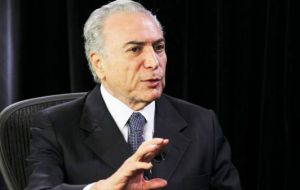MercoPress. South Atlantic News Agency
Brazil's Lower House approves by ample margin amendment to freeze spending
 The result - 366 votes in favor, 111 against, and 2 abstentions - was obtained with efforts from Temer which included a dinner for more than 200 lawmakers
The result - 366 votes in favor, 111 against, and 2 abstentions - was obtained with efforts from Temer which included a dinner for more than 200 lawmakers Brazil's Lower House of Congress approved on Monday a document which is the base for a Proposed Constitutional Amendment (PEC) that would freeze federal spending for the next 20 years, a legislative priority for Michel Temer's government in 2016.
The result - 366 votes in favor, 111 against, and 2 abstentions - was obtained with the personal efforts of the President himself, which included a dinner for more than 200 congressmen on Sunday night (the 9th).
Temer even dismissed three government ministers - Fernando Coelho (Mining & Energy), Bruno Araújo (Cities) and Marx Beltrão (Tourism) - so they could retake their positions as Federal Congressman to vote for approval of the measure.
The document still has to pass through a second vote, which will probably take place in the last week of October. After this, it will go on to the Senate for analysis.
The proposal approved restricts increases in government spending to the IPCA (National Full Consumer Price Index) for the previous 12 months.
The final text provided for more latitude for health and education. In these two areas, the floor for spending will only go into effect starting in 2018, or in other words, the base used in the calculation of what can be spent will be 2017, when government incomes are expected to be higher than in 2016.
In addition, the report establishes that the base for calculation of the floor for healthcare expenditures in 2017 will be 15% of net government incomes, and not the 13,7% that was stipulated in the original text.
This change results in a floor of around R$ 113,7 billion (US$ 35 billion) for the areas next year, or, R$ 10 billion (US$ 3,08 billion) more than had originally been forecast.




Top Comments
Disclaimer & comment rules-

-

-

Read all commentsMaking laws now to limit government spending in 20 years' time? How is that a good idea? Anything could change. And setting the floor for health and education based on next year's completely unknown figures seems pretty risky too.
Oct 12th, 2016 - 09:21 pm 0Also anyone want to bet on how much resemblance the IPCA will have to reality in 10 years' time? I'm guessing it'll make CFK's inflation figures look as accurate as Switzerland's...
The Law has put a cap on Govt spending for 20 years (long-term planning, in order to have a target), but one thing that is not being divulged forcefully enough by the Press, and being downplayed or distorted deliberately by the opposition (the PT , PCdoB, PSD), is that IF the economy picks up, there is nothing to prevent the same Congress, say in 3 years time, from presenting another Constitutional amendment to alter what's being decided now. It's only logic - if the economy does pick up, so does the GNP, and along with it, the revenue that determines the yearly budget - which in turn will provide more funds for the various sectors. If education today, is being limited to 15% of the budget, and if projected revenue starts to increase, this implies that so will the funds destined to education (and health) ; the 15% will increase proportionately, in absolute terms. And just as a matter of guidance, the 15% earmarked for education in 2017 (provided the amendment is eventually approved in all stages through Congress) is R$ 9 billion higher than the current budget for 2016.
Oct 13th, 2016 - 10:37 pm 0On the other hand, if the Govt does to not get spending under severe control, in 5 years the country will be totally broke, and no one will receive anything....And one of the main reasons to curb spending', is the retirement and pension system, which currently produces, if not mistaken, a yearly deficit of US$ 40 billion, covered by the Treasury. Fraud is rampant - in the case of pensions received by people considered unfit for work, for any reason, 8 out of 10 pensions are fraudulent.
Also, this reform will address the unfair practise of public servants retiring on full salary, whereas the the private sector, has to respect a ceiling, usually a mere pittance of the salary earned while active. There is a lot wrong, and it has to be corrected. Decades of ignoring the problems has lead to the current mess.
I'm not an expert on constitutions, but aren't they supposed to be about how the government works, and the general rights of the people, rather than specific laws?
Oct 14th, 2016 - 10:46 pm 0What is the purpose of passing the law, if it can easily be overturned later? Does the current government think a future PT administration would have difficulty getting a 3/5 majority?
And I understood from the article, that government spending is being limited according to inflation, not whatever the budget is. Which would mean it would be limited even if/when the economy picks up again. So which is it?
Are you serious that public sector workers get their full salary when they retire? That is crazy!
But if the main spending problem is the pension system, why doesn't the government just limit that, rather than including everything? And what do you think of the suggestion in an earlier article that the spending cap could interfere with the corruption investigations?
Commenting for this story is now closed.
If you have a Facebook account, become a fan and comment on our Facebook Page!